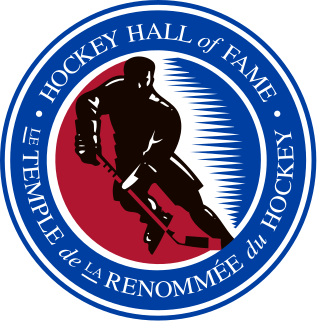
The Hockey Hall of Fame is a museum and hall of fame located in Toronto, Ontario, Canada. Dedicated to the history of ice hockey, it holds exhibits about players, teams, National Hockey League (NHL) records, memorabilia and NHL trophies, including the Stanley Cup. Founded in Kingston, Ontario, the Hockey Hall of Fame was established in 1943 under the leadership of James T. Sutherland. The first class of honoured members was inducted in 1945, before the Hall of Fame had a permanent location. It moved to Toronto in 1958 after the NHL withdrew its support for the International Hockey Hall of Fame in Kingston, Ontario, due to funding issues. Its first permanent building opened at Exhibition Place in 1961. The hall was relocated in 1993, and is now in Downtown Toronto, inside Brookfield Place, and a historic Bank of Montreal building. The Hockey Hall of Fame has hosted International Ice Hockey Federation (IIHF) exhibits and the IIHF Hall of Fame since 1998.

Canada competed at the 1920 Summer Olympics in Antwerp, Belgium. 52 competitors, all men, took part in 38 events in 9 sports. These games marked the introduction of winter sports to the Olympic program ; Canada won its first gold medal for ice hockey.
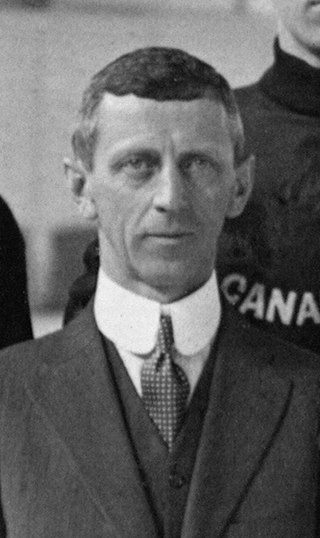
William Abraham Hewitt was a Canadian sports executive and journalist, also widely known as Billy Hewitt. He was secretary of the Ontario Hockey Association (OHA) from 1903 to 1966, and sports editor of the Toronto Daily Star from 1900 to 1931. He promoted the establishment of the Canadian Amateur Hockey Association (CAHA), then served as its secretary-treasurer from 1915 to 1919, registrar from 1921 to 1925, registrar-treasurer from 1925 to 1961, and a trustee of the Allan Cup and Memorial Cup. Hewitt standardized player registrations in Canada, was a committee member to discuss professional-amateur agreements with the National Hockey League, and negotiated working agreements with amateur hockey governing bodies in the United States. He oversaw referees within the OHA, and negotiated common rules of play for amateur and professional leagues as chairman of the CAHA rules committee. After retiring from journalism, he was the managing-director of Maple Leaf Gardens from 1931 to 1948, and chairman of the committee to select the inaugural members of the Hockey Hall of Fame in 1945.
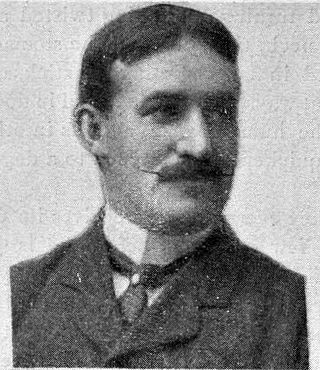
James Thomas Sutherland was a Canadian ice hockey administrator, and founding father of the game in Canada. Sutherland was a pioneer of hockey's early years, helping to develop amateur hockey, and spread the game's popularity throughout the country, and into the United States. He played in the inaugural season of the Ontario Hockey Association, and later coached and refereed the game. He founded the original Kingston Frontenacs, and later became president of the Ontario Hockey Association, and then the Canadian Amateur Hockey Association. He was instrumental in founding the Memorial Cup in 1919, and was at the forefront of the discussion on the origins of hockey.
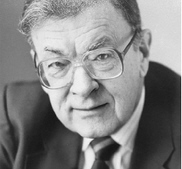
John Walter "Bill" Fitsell was a Canadian journalist, writer and historian. He was a columnist for The Kingston Whig-Standard from 1961 to 1993, and was the founding president of the Society for International Hockey Research in 1991. He was involved with the International Hockey Hall of Fame from 1969 to 2005, serving as its curator and historian. He published five books during his career including four on the history of ice hockey, and helped organize the Historic Hockey Series to commemorate early ice hockey games played in Kingston, Ontario. He was inducted into both the Kingston and District Sports Hall of Fame and the Lindsay District Sports Hall of Fame, and received the 125th Anniversary of the Confederation of Canada Medal.

George Samuel Dudley was a Canadian ice hockey administrator. He joined the Ontario Hockey Association (OHA) executive in 1928, served as its president from 1934 to 1936, and as its treasurer from 1936 to 1960. He was elected to Canadian Amateur Hockey Association (CAHA) executive in 1936, served as its president from 1940 to 1942, as its secretary from 1945 to 1947, and as its secretary-manager from 1947 to 1960. He was secretary of the International Ice Hockey Association from 1945 to 1947, and was later vice-president of the International Ice Hockey Federation (IIHF) from 1957 to 1960. He was expected to become the next president of the IIHF before his death. He graduated from Osgoode Hall Law School in 1917 then practiced law for 43 years as the town solicitor for Midland, Ontario.

Gordon Wainwright Juckes was a Canadian ice hockey administrator. He served as the president and later the executive director of the Canadian Amateur Hockey Association (CAHA), and as a council member of the International Ice Hockey Federation. Juckes became involved in hockey as newspaper publisher and team president, then served as president of the Saskatchewan Amateur Hockey Association. During World War II he was a Major in the Royal Canadian Artillery, and was honoured with the Order of the British Empire.

The IIHF Hall of Fame is a hall of fame operated by the International Ice Hockey Federation (IIHF). It was founded in 1997, and has resided at the Hockey Hall of Fame in Toronto since 1998. Prior to 1997, the IIHF housed exhibits at the International Hockey Hall of Fame in Kingston, Ontario. Inductions are made annually at the medal presentation day of the Ice Hockey World Championships. As of 2024, the IIHF has inducted 253 members.

Allan Wilfrid Pickard was a Canadian ice hockey administrator, who served as president of the Canadian Amateur Hockey Association (CAHA) from 1947 to 1950. When Canada opted out of the 1947 Ice Hockey World Championships and decided not to participate in the 1948 Winter Olympics, Pickard felt that Canada was obliged to send a team due to its place as a top hockey nation, and nominated the Ottawa RCAF Flyers who won the gold medal for Canada and lived up to the requirements of the Olympic Oath as amateurs. Despite disagreement with the International Olympic Committee, he sought for the International Ice Hockey Federation to adopt the CAHA definition of amateur in the face of increasing difficulty in selecting the Canada men's national ice hockey team.
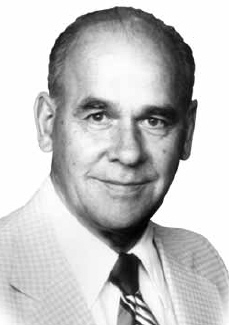
Frederick Page was a Canadian ice hockey administrator and ice hockey referee. He originated from Port Arthur, Ontario, where he played junior ice hockey, refereed locally and later at the Memorial Cup and Allan Cup competitions. He was a league executive in Fort William, then served as president of the Thunder Bay Amateur Hockey Association from 1958 to 1962. He was elected second vice president of the Canadian Amateur Hockey Association (CAHA) in 1962, and rose up the ranks to be its president from 1966 to 1968. Page wanted the CAHA to gain more control over its affairs, and become less dependent on the National Hockey League (NHL). Under his leadership, the NHL ended direct sponsorship of junior hockey teams. He was instrumental in negotiating the revised agreement for the NHL Amateur Draft in 1967, and later served as co-chairman of the resulting joint player development committee.

John Maxwell Roxburgh was a Canadian ice hockey administrator and politician. He organized minor ice hockey in his hometown of Simcoe, Ontario, co-founded the Ontario Juvenile Hockey Association in 1934, and the Ontario Minor Hockey Association in 1940. He served as president of the Ontario Hockey Association from 1950 to 1952, improved its finances to become profitable, and appointed Bill Hanley as a full-time manager to operate the association as a business. Roxburgh served as president of the Canadian Amateur Hockey Association from 1960 to 1962, arranged exhibition games between Canada and the Soviet Union amid an increased rivalry between the respective national teams, and pushed for the separation of politics and sport when the Cold War threatened to cancel the 1962 Ice Hockey World Championships. He was opposed to changes in the Olympic Oath and the international definition of amateurism, and later recommended the formation of a student-athlete team coached by Father David Bauer to become the Canada men's national ice hockey team.
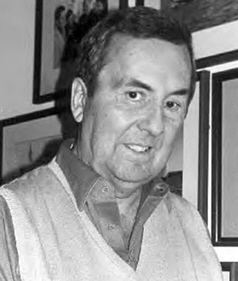
Gordon Ralph Renwick was a Canadian ice hockey administrator, who served as president of the Canadian Amateur Hockey Association (CAHA), vice-president of the International Ice Hockey Federation (IIHF), and was the team president of the Galt Hornets.

William George Hardy was a Canadian professor, writer, and ice hockey administrator. He lectured on the Classics at the University of Alberta from 1922 to 1964, and served as president of the Canadian Authors Association. He was an administrator of Canadian and international ice hockey, and served as president of the Alberta Amateur Hockey Association, the Canadian Amateur Hockey Association (CAHA), the International Ice Hockey Association, and the International Ice Hockey Federation.
Bob Nadin is a Canadian retired ice hockey referee and administrator. He refereed at the 1972 Winter Olympics, and served as a referee supervisor for the International Ice Hockey Federation (IIHF), the National Hockey League, and the Canadian Amateur Hockey Association. He was involved with the Winter Olympic Games every Olympiad from 1972 until 2012, and was honoured by the International Olympic Committee with the Pierre de Coubertin Medal. The IIHF honoured Nadin with the Paul Loicq Award, and inducted him into the IIHF Hall of Fame.

William John Devine was a Canadian ice hockey administrator and radio sports commentator. He worked for CJBQ radio in Belleville, Ontario for 40 years as the sports director. He was involved with the local sports scene, and was president of the Ontario Hockey Association from 1967 to 1969. He moved up to the national level in 1969 becoming vice-president of the Canadian Amateur Hockey Association (CAHA) in 1969, and later served as its president from 1973 to 1975.

Roman Neumayer was an Austrian and German ice hockey executive. He served as the sport director of the German Ice Hockey Federation from 1970 to 1986, and as technical director for the International Ice Hockey Federation from 1986 to 1996. He received the Paul Loicq Award for services to international ice hockey, and was inducted into the German Ice Hockey Hall of Fame.

Lloyd Thompson Pollock was a Canadian ice hockey administrator and businessman. After running the Windsor City Hockey League, he assisted in the foundation of the Windsor Softball League, and later started a junior ice hockey league in Windsor, Ontario. He was a cofounder of the International Hockey League in 1945, and founder of the original Windsor Spitfires junior team in 1946. He served as president of the Ontario Hockey Association (OHA) from 1961 to 1963, welcomed the Montreal Junior Canadiens into the OHA when it was divided by the Metro Junior A League, and supported measures to preserve the Northern Ontario Hockey Association.
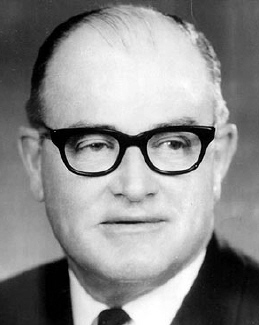
Frank Forest Sargent was a Canadian sports executive in ice hockey and curling. He served as president of the Canadian Amateur Hockey Association (CAHA) from 1942 to 1945, and was president of the Dominion Curling Association (DCA) from 1965 to 1966. He was the first person to be elected to more than two terms as CAHA president, and the first to be president of two national amateur sporting associations in Canada.
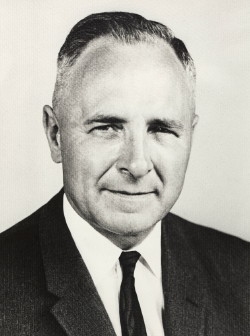
Arthur Thomas Potter was a Canadian ice hockey administrator. He was president of the Canadian Amateur Hockey Association (CAHA) from 1962 to 1964, and oversaw the establishment of a permanent Canada men's national ice hockey team after he decided that sending the reigning Allan Cup champion to international competitions was no longer the answer. He felt that Canada needed discipline to handle Cold War tactics and propaganda at the Ice Hockey World Championships, sought to give its best players to develop as a team, and supported a plan by Father David Bauer to assemble a team of amateur student athletes to complete at the 1964 Winter Olympics.

Lionel Fleury was a Canadian ice hockey administrator who served as president of the Canadian Amateur Hockey Association from 1964 to 1966. Under his leadership, the Canada men's national ice hockey team transitioned from student athletes coached by Father David Bauer into a year-round national team program. Fleury welcomed the Newfoundland Amateur Hockey Association as a new branch member of the national association in 1966, and changed the format of the Memorial Cup playoffs in Eastern Canada from an elimination bracket into a round-robin format to reduce travel costs and address concerns of imbalanced competition. He sought an end to the National Hockey League system of sponsoring amateur teams by replacing it with a draft of players who had graduated from junior ice hockey, and negotiated for a new agreement that was realized after his term as president concluded.





















